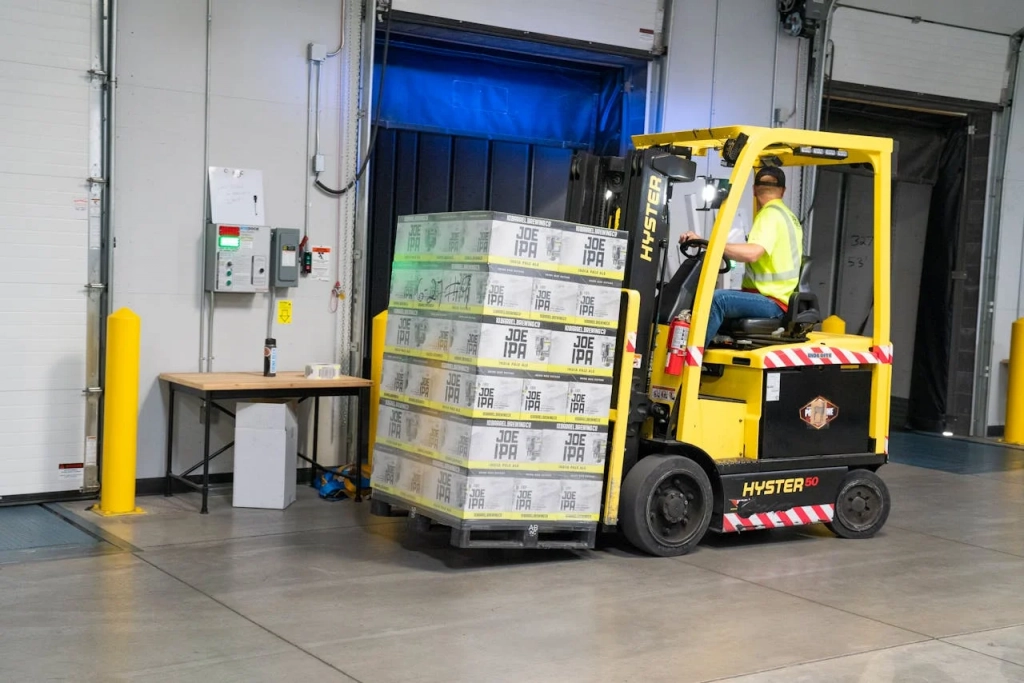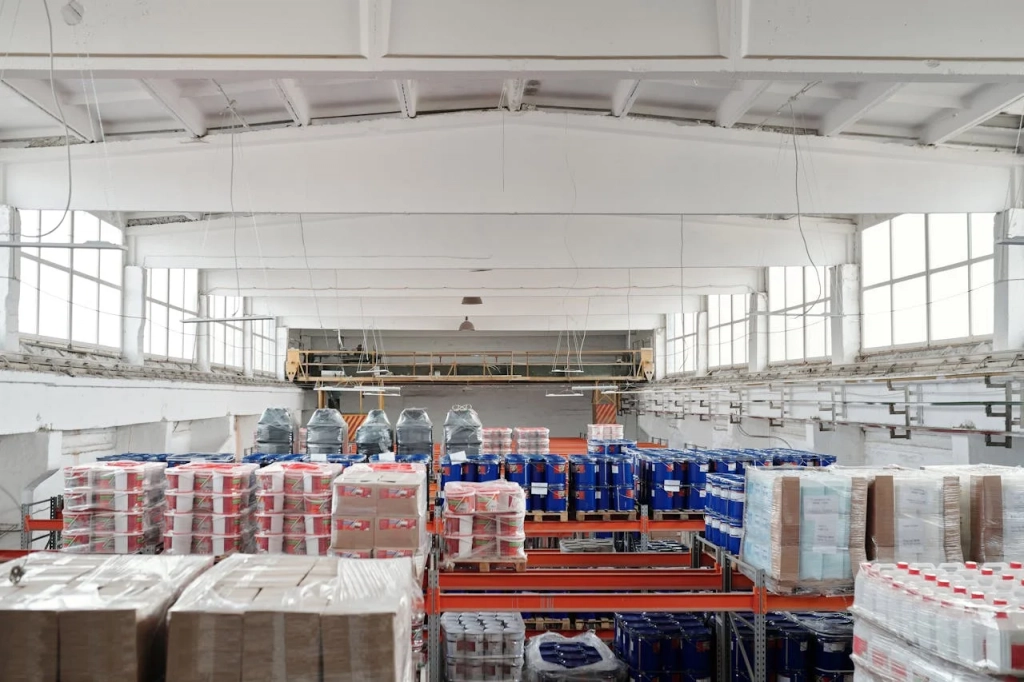Working as a warehouse operative or logistics employee in Germany means getting access to Europe’s largest, most stable and highly regulated labor market. As the country is Europe’s central hub of manufacturing and global trade, the demand for workers in the supply chain, from order pickers (Kommissionierer) to forklift driver (Staplerfahrer), is consistently high.
This article aims to provide a closer look into the ins and outs of the warehouse worker salary in Germany for 2026, detailing how earnings are structured by minimum wage (Mindestlohn), experience, regional differences, and the crucial role of collective agreements (Tarifvertrag).
How Much Does a Warehouse Worker Earn in Germany?
To understand the average warehouse worker salary in Germany, we must first establish the legal floor, as this sector is heavily influenced by the national minimum wage.
The Foundation: Minimum Wage and Base Income
As of 2025/2026, the German national minimum wage (Mindestlohn) is approximately €12.41 gross per hour. If that’s the base salary for the job, then the warehouse worker salary in Germany per hour will also be the same, not counting the additional shift allowances and bonuses.
What this means is that for a standard, full-time contract (more or less 160 hours a month, on average), the warehouse worker salary in Germany per month for an entry-level job will be at least €1,985. This figure serves as the starting ground and represents far more stability than lower, reported statistical averages which often include part-time workers, temporary jobs, and regional variations.
Statistical Averages and Distribution
Official salary data provides a broad picture of the average salary of a warehouse worker across all contract types, experience levels, and job roles.
| Salary Type | Amount (EUR) |
| Reported Average Annual Salary | €13,900 |
| Reported Average Monthly Salary | €1,158 |
| Lowest Annual Salary | €5,620 |
| Highest Annual Salary | €21,400 |
Decoding the Salary Range
As you can see, there’s quite a considerable gap between the lowest and the highest reported annual earnings. This discrepancy (€5,620 vs. €21,400) showcases the diverse roles in logistics. From part-time and packer roles to highly skilled material handler roles.
The median salary for a warehouse worker is €12,580 per year. Furthermore, the data indicates that 75% of workers earn more than €10,320, and only 25% of the population earn more than €18,280. If your income exceeds the median, you are generally considered to be earning well compared to the overall population in this sector.

Source: Pexels
The Compensation Structure and Gross vs. net Salaries
All figures above are gross salary. The transition from gross to net salary is critical due to mandatory deductions for social security contributions and income tax.
- Social Security Contributions: Nearly 20% of your gross wage is deducted for mandatory health insurance (Krankenversicherung), pension, and unemployment insurance.
- Income Tax (Lohnsteuer): This is determined by your tax class (e.g., Tax Class I for single persons).
What this means is that if someone is earning the minimum wage (or €1,985 gross/month), they will typically take home a net monthly income of around €1,400 to €1,500.
Disclaimer on Salary ExpectationsAt Robin.jobs, we aim to give you the clearest possible picture of what to expect when working abroad. While the average salaries in Germany discussed in this article reflect national data from official sources, the wages listed in our vacancies may vary.. However, it’s important to consider the full picture: our job offers typically come with low -cost accommodation. While accommodation isn’t free, it is typically below market rates and arranged by our partner agencies abroad. This ensures candidates have a secure place to stay as they begin settling into a new country and job. These benefits significantly reduce your monthly expenses and often allow you to save more than you could with a higher salary in a big city with high living costs. We focus on legal, reliable, and fair work opportunities, helping you start earning from day one, without the financial burden of high rent, long commutes, or upfront costs. |
What Drives the Warehouse Worker Wage?
What are the main components that decide the hourly rate of the worker and the total amount of compensation? These are highly dependent on location, skill, experience, and job title.
Experience and Vocational Training (Ausbildung)
It’s no secret that as a person moves from a beginner, entry-level salary to an experienced worker, their wages also increase significantly. This reflects the value of practical expertise and the attainment of specialized certifications (e.g., forklift driver license).
Below are rough estimates of how experience can influence the average warehouse worker salary in Germany:
| Experience Level | Annual Gross Pay (EUR) |
| 0-2 Years | €8,440 |
| 5-10 Years | €13,960 |
| 20+ Years | €19,860 |
Apart from experience, vocational training, or Ausbildung in German, can further dramatically separate earnings. Just like in the cases of electricians in Germany, a worker with a dedicated certificate or diploma in logistics can expect to earn nearly double that of a worker with only a high school education, with the average jumping from €6,440 to €15,580, which is a massive increase of 93%.
Fortunately, lots of logistics companies across Europe offer additional training courses (such as forklift certifications) offering a chance for workers who want to advance.

Source: Pexels
Location and Regional Differences
How much does a warehouse worker earn in Germany? Apart from the factors we already discussed, the place you live in will also influence your monthly salary. Due to variations in the cost of living and regional economic strength, there are notable regional differences in pay, though the national minimum wage provides a strong floor everywhere. Generally, major logistics hubs in West Germany and key cities offer higher wages.
More or less, this is how the warehouse worker Salaries by City in Germany looks like:
| City | Average Annual Salary (EUR) |
| Munich (München) | €15,880 |
| Berlin | €14,840 |
| Hamburg | €14,660 |
| Stuttgart | €14,540 |
| Nurnberg | €9,940 |
Additional Pay and Allowances
Working as a warehouse worker in Germany means the chance to work shifts and get overtime pay (Überstunden) which are among the fastest ways of boosting your annual earnings.
- Shift Allowance (Schichtzulage): Work during late hours (typically 9 PM to 6 AM) qualifies for a night shift allowance (Nachtzuschlag), which usually adds 25% to the base hourly rate.
- Overtime Pay: Work exceeding contractual hours is paid at a premium, often +25% to +50%.
- Bonuses: Employees in Germany typically receive a holiday bonus (Urlaubsgeld) and sometimes a Christmas bonus (Weihnachtsgeld), especially if their employer is bound by a collective bargaining agreement (Tarifvertrag).
Keep in mind that shift allowances, overtime pay, and bonuses may vary from company to company. Sometimes, even roles at the same company may have varying bonuses. For example, if your coworker works with fruits, vegetables, and meats, they may also get a cold allowance, as they probably spend most of their working hours near or inside freezers.
The Back Bone of the warehouse worker wage: The German Labor Environment and Stability
To keep wages competitive and more or less concise across the country, there are different work models and documents set in place. These include:
Collective Bargaining Agreements (Tarifvertrag)
Unlike the Netherlands, where wages are often based on agency contracts, Germany heavily relies on collective bargaining agreements. These agreements are negotiated between powerful unions and employer associations and cover millions of workers.
When a company is bound by a Tarifvertrag, it means wages, pay raises (average of 6% per year), vacation days, and shift allowances are non-negotiable and apply equally to all employees in the covered job role. This provides exceptional job security and transparency.
Temporary Work and Zeitarbeit
Many international workers start through a temporary work agency (Zeitarbeit). These agencies must still adhere to the principle of “equal pay for equal work” (Gleiches Geld für gleiche Arbeit), meaning after a specific period (usually nine months), the temporary worker must earn the same rate as a permanently employed staff member doing the same job.
What this means is that in Germany, the warehouse worker salary has a unified character which means that people who come to work through Robin, don’t have to work for less money than those with direct contracts.
Public vs. Private Sector
Workers in the logistics and manufacturing fields employed in the Public Sector (e.g., city sanitation, public transport logistics) tend to earn approximately 8% more on average than their counterparts in the Private Sector.
Understanding Agency Jobs and Your Warehouse Worker Salary in Germany
You might notice that some warehouse jobs through agencies showcased on Robin list slightly lower salaries than what’s advertised for direct contracts in Germany. But here’s what many workers don’t realize: these positions often work out better overall, especially when you’re just starting your career abroad.
The biggest benefit comes from affordable housing.
Through an agency, you’ll usually pay around €150–€170 per week for accommodation. If you try to find your own apartment in Germany, rent can easily reach €900–€1,400 per month, depending on the city. That’s a saving of several hundred euros every month. That’s money that stays in your pocket.

Source: Pexels
When you work in Germany through an agency, you also get support with all the practical details of relocating. Agencies help you with your work registration, health insurance, tax number, and even transportation to work. Many employers also offer company housing close to the workplace, saving you long commutes and extra costs.
While the agency takes care of many of these arrangements, your total benefits often make up for any small difference in hourly wage. When you factor in housing, transport, and a quick start, agency work can be the smartest financial choice, especially for newcomers in Germany.
Making The Most out Of The Average Warehouse Worker Salary in Germany
The key takeaway for any logistics professional considering work in Germany is the immense stability offered by the labor market. While the statutory minimum wage sets a high floor for the hourly rate, your long-term income potential relies heavily on two factors: upskilling and location.
- Skill Up: Focus on attaining specialized skills like becoming a certified forklift driver (Staplerfahrer) or receiving formal vocational training (Ausbildung). This is the single biggest determinant of a jump in your base pay.
- Go West: While East Germany vs West Germany differences are narrowing, the highest salaries are still found in major logistics hubs and cities like Munich, Hamburg, and Berlin.
Germany’s commitment to regulated pay, high mandatory social security benefits, and predictable raises through the collective bargaining agreement (Tarifvertrag) system makes it an excellent choice for building a secure, long-term career in logistics.
Find Your Next Warehouse Job in Germany
As you can see, the German warehouse worker’s average salary is influenced by various factors. Additionally, the logistics sector in Germany is in constant demand, and major hubs like Hamburg, Frankfurt, Berlin, and Cologne are on the constant lookout for new employees. The average salary for a warehouse worker in Germany remains competitive, with overtime pay, shift bonuses, and stable full-time hours.
This is where Robin can help you. By working through us, you also get:
- Help with accommodation and transport
- Paperwork and registration handled for you
- Support in English or your native language
- No hidden fees or deductions
With over 40,000 workers already placed abroad, Robin Jobs makes the process simple and transparent. Create your profile today and let us connect you with trusted German employers who are hiring warehouse workers right now.

 English
English  Lietuvių
Lietuvių  Latviešu
Latviešu  Polski
Polski  Português
Português  Română
Română  Slovenčina
Slovenčina  Magyar
Magyar  Русский
Русский  Espanol
Espanol  България
България  Čeština
Čeština  Italy
Italy  Croatia
Croatia  Greek
Greek 

